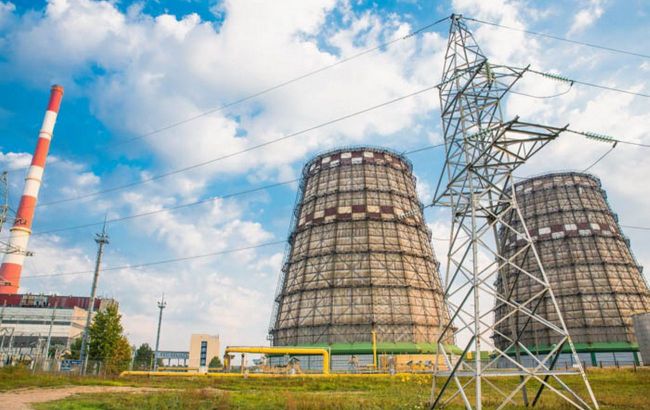Lithuania transfers CHP plant: Details and how much energy capacity Ukraine will gain
 Lithuania gives Ukraine a station that used to be in Vilnius (ignitisgamyba.lt)
Lithuania gives Ukraine a station that used to be in Vilnius (ignitisgamyba.lt)
Lithuania is transferring a Combined Heat and Power Plant (CHPP) to Ukraine as part of its energy assistance. It is expected to start operating within Ukraine's energy system before the onset of winter.
More about it and how much additional energy capacity Ukraine receive is detailed in RBC-Ukraine's report below.
Contents:
- How entire CHP plant will make its way to Ukraine
- About Vilnius CHPP
- Enough for a city the size of Vilnius?
How entire CHP plant will make its way to Ukraine
At a press conference in Brussels, European Commission President Ursula von der Leyen said that since the beginning of the Russia-Ukraine war, the Kremlin has targeted Ukraine's energy infrastructure in an attempt to plunge the country into darkness. During this time, half of Ukraine's energy infrastructure has been destroyed, equivalent to the capacity of the three Baltic states combined.
She specifically highlighted the 12-hour attack on August 26, which left millions of Ukrainians without power for several hours. "As Ukraine’s friends and partners, we must do all we can to keep the lights on [in the country], and as winter approaches, we must keep the brave people of Ukraine warm while also keeping the economy running," said the head of the European Commission.
According to her, Ukraine needs 17 GW of capacity for the winter, and the European side is ready to cover a quarter of this, partly through recovery assistance. Over 10,000 generators and transformers have been provided through the Civil Protection Mechanism already.
"As we speak, there is a full thermal power plant that is being dismantled in Lithuania and shipped piece by piece to Ukraine, with our support, and then rebuilt in Ukraine. This shows the great length of the European Union's and Member States' willingness to support Ukraine," said von der Leyen.
She reiterated the announcement about Lithuania’s transfer of a CHP plant during a meeting with Ukrainian President Volodymyr Zelenskyy last Friday. While she didn’t specify which plant, all signs point to the Vilnius CHP-3.
At least, that’s the station previously mentioned. In mid-July, Lithuanian company Ignitis Gamyba announced the transfer of a CHP plant. At the same time, a humanitarian aid agreement was signed. According to DW, the transfer was arranged with the operator Khmelnytskoblenergo.
"It was not by chance that we decided to hand over the Vilnius TPP-3 equipment. Apart from the fact that it will work well in Ukraine's energy infrastructure, it also meets the needs of the transmission system operator," said Asta Sungailiene, CEO of Ignitis Gamyba.
About Vilnius CHPP
The Vilnius CHP-3 was Lithuania’s third-largest power station. Its installed thermal capacity was 600 MW, and its electrical capacity was 360 MW.
Construction began in the 1970s on the left bank of the Neris River in the village of Jočionys, 13 kilometers from the capital’s center. The first unit was installed in the summer of 1983, along with a 250-meter-high chimney and a 20,000-ton oil storage tank. By mid-autumn, most of the work was completed, and the station officially launched on December 29, 1983.
By the early 2010s, the Vilnius CHP-3 had the highest emissions in Lithuania. As a result, plans were announced to shut it down. In 2013, proposals were made to retrofit the station for biofuel or municipal waste, but by 2015, the government declared that the station was no longer essential for heating Vilnius.
Regarding the equipment, the steam boiler with an intermediate steam superheater was manufactured by the Taganrog Boiler Plant, the turbine by the Leningrad Metal Plant, and the turbogenerator by Kharkiv's Electrotyazhmash plant. Therefore, Ukrainian energy experts should be well-acquainted with the Vilnius CHP-3's equipment.
According to Asta Sungailiene, the station was shut down in 2015 due to high operational costs, and its units did not significantly impact the stability of Lithuania's energy system.
"Even though the plant has been closed for nine years, we were able to preserve its equipment, which retained its full functionality. The plant, with a total heat and electrical capacity of nearly 1,000 MW, operated for over 30 years and supplied heat to around half of Vilnius. Now this equipment will contribute to the restoration of vital infrastructure in Ukraine," she said.
Enough for a city the size of Vilnius?
The aid package from Ignitis Gamyba includes over 300 pieces of equipment from the Vilnius CHP-3. However, the real value lies in the timing of delivery and integration into Ukraine’s energy system.
The company is not disclosing details about the equipment’s capacity or the Ukrainian power station it will be assigned to. They only emphasize that rapid delivery and integration are the top priorities in the critical period of 2024.
However, Lithuanian Energy Minister Dainius Kreivys said that the transferred CHP plant should start operating in Ukraine this winter. "We plan to complete everything on time. We must, because otherwise, many people may be left without power or heat," he said in the summer.
According to him, Russian attacks since early 2024 have destroyed infrastructure worth over 11 billion euros. The coming winter in Ukraine will be very tough, so partners must help. "We must prevent entire cities – whether Chernihiv, Kharkiv, or others – from freezing or being left in the dark," the minister said.
The dismantling of the Vilnius CHP involved Lithuanian specialists, while assembly in Ukraine will be carried out by Ukrainian teams. All the work is being financed by the European Commission.
In Kreivys' opinion, the power station can supply electricity to a city the size of Vilnius, with a population of about 550,000 people.
"This is indeed a large amount of electricity. Nearly 400 MW. Plus heat. If it kept Vilnius warm, it could certainly benefit a city of a similar size. Maybe not all parts of a city in Ukraine will receive power, but this will undoubtedly be a significant help. When the Ukrainians saw the quality of our equipment, they were thrilled to receive it," he added.
Likely for security reasons, the Ukrainian side has not yet publicly commented on the receipt of the Lithuanian CHP plant. However, with winter approaching, every megawatt counts, and even 400 MW of aid will be invaluable.
Sources: statements by European Commission President Ursula von der Leyen, Ignitis Gamyba CEO Asta Sungiaylene, Lithuanian Energy Minister Dainius Kreivys, and BNS and LRT.

